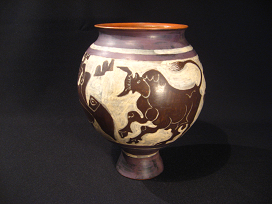Agricultural Education/Rural. Education in Entre Ríos, Argentina. Continuity and Change (1930-1943)

Published 2019-11-12
How to Cite
Abstract
The purpose of this article is to analyze agricultural and rural education in the province of Entre Ríos (Argentina) between 1930 and 1943, period characterized by the conservative restoration and the agrarian socioeconomic fluctuations. The province has a rich educational history with the Normal Schools of Paraná and the school of Uruguay at the head. The peculiarity of Entre Ríos in terms of agricultural education was that the normalists were those who promoted it in the provincial jurisdiction since the late nineteenth century - from the school of rural teachers Alberdi- unlike the Ministry of Agriculture of the Nation in which agronomists prevailed and a more technical profile. We think that to train the "real Argentine farmer” in a province with a strong immigrant presence, it was the purpose of both systems, although for the normalists it was linked to the problem of literacy. And this critical decade also affected the system in different ways. Analysis of curricula, edited and unpublished sources, preserved in provincial and national repositories, provide the precise material for the study.
Downloads
References
GUTIÉRREZ, T. V. (2007). «Políticas de orientación agrícola y pedagogía normalista. Entre Ríos (Argentina), 1900-1920». Perfiles Educativos, vol. XXIX, n.º 117, pp. 85-110.
GUTIÉRREZ, T. V. y DE ARCE, A. E. (2014). «Cultura alimentaria y hogares rurales ante la crisis agroexportadora (Argentina, 1930-1945)», presentado al XVII Congreso Internacional de AHILA, Berlín, 9 al 13 de setiembre.
LLACH, J. J. (1984). «El Plan Pinedo de 1940, su significado histórico y los orígenes de la economía política del peronismo». Desarrollo Económico, vol. 23, n.º 92, pp. 515-558.
SUÁREZ, E. y VALMARROSA, M. V. (2010). «La lechería de los Aguer: una aproximación al oficio de tambero en Paraná en 1910». Fotografía e Historia. Edición especial del bicentenario, pp. 131-140.
Fuentes
100 años, 1912-2012. Centenario de la Estación Experimental Agropecuaria Concordia. Entre Ríos: INTA-Ministerio de Agricultura, Ganadería y Pesca de la Nación, 2012.
ALLEN, R. (1929). Enseñanza agrícola. Documentos orgánicos. Buenos Aires: MAN.
ARCHIVO HISTÓRICO DE ENTRE Ríos (AHER). Fondo educación, Serie IX, Nogoyá, Caja 3, 1906 exp. n.º 3, 1910 exp. n.º 4, 1911 exp. n.º 3; Caja 5 1915 expte. n.º 8.
AHER, Fondo educación, Serie XII, Caja 12, Villaguay, 1930-1943.
AHER, El Alberdino, 17/4/1935.
DEL CARRIL, L. M. (1932). «L’enseignement agricole en Republique Argentine», en Actes du IVème. Congrés International de l’Enseignement agricole, Rome-Milán, 24 al 31 de octubre.
Boletín de educación, Paraná, 1925; pp. 59, 60. Escuela Normal de Maestros Rurales Alberdi, Museo y Archivo, Notas del Consejo General de Educación, 31/3/1933 y 3/4/1933.
MINISTERIO DE AGRICULTURA DE LA NACIÓN (MAN) (1948). La escuela primaria rural, Buenos Aires.
MAN (1940, 1941, 1942). Anales de Enseñanza Agrícola (AEA),
MINISTERIO DE HACIENDA DE LA PROVINCIA, DEPARTAMENTO AGRÍCOLA GANADERO (1936). Reglamento interno y plan de estudios de la Escuela granja Urquiza, 1936.
